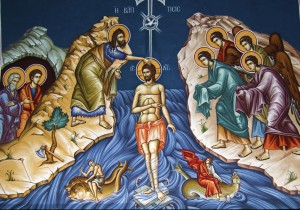A lot of people are currently discussing their understanding of the gods. Traci issues a challenging reminder not to let anthropomorphism cloud our understanding. Morpheus Ravenna, John Beckett, Sara Amis, and others, all give us their thoughtful perspectives. I hesitate to wade into the discussion, even though this is the very sort of discussion I’m trained to dissect.
I think that’s part of why discussing the gods is so challenging for me: I have too many theories, too many fancy words, and too much monotheism crammed into my brain. It’s only been a few years since I finally and completely stopped trying to keep a toe in the Christian tradition, since I stopped trying to make Christian mystic theology make sense of my experience. It’s only been a few years since I’ve adopted the mindset of polytheism. I feel like I’m back to theology 101. Even though I understand the concepts and the words used in these sorts of theological discussions, my experience is so limited at this point as to make intelligent, mature speculation on the gods infantile at best.
Because that’s what these discussions are: speculation. We are all making guesses as to who or what the gods are. Most of us, if we are wise, will listen and learn from those who are ‘further down the path’ than we are. We will use discernment and sincere reflection to examine our own experiences of the spirits and the gods. We will use reason and observation, along with spiritual insight, in both of those previous endeavors. But we’re all still speculating.
Stepping away from a monotheistic frame of reference was mind-bending for me. I felt like I finally saw my experiences and understandings of all things spiritual in a new light, a bright, shiny, flood light. No longer did I have to mush everything into a box marked One God. Because I’ve experienced other presences. Sometimes they have felt more like possible emanations of a greater Whole; sometimes they have been completely, absolutely distinct. Sometimes they have been very human like – was that their True Form or just the way they chose to express themselves to me, so that I might understand? Sometimes they have been Unformed. I still don’t know what this means or how these experiences link together in a coherent system. Right now, that’s not the point for me.
Right now, I’m allowing myself to experience, to follow where I am led – by the gods, by my teachers, by my own Godsoul. Down the road I’ll likely attempt something Theological, but for me, I’m trying to be less caught up in the details.
That said, I think the discussions that are occurring are important: for our own personal development and for our evolution as a wider Pagan community. We don’t all have to agree – heck, the Christian tradition has been disagreeing for 2,000 years! They’ve written entire books on the shades of meaning of a single idea. In fact, churches have been tipped into schism over a single word.
I’m learning a lot from what my fellow travelers are debating. Reading about how they experience the gods and carefully observing the words they’ve chosen to use in their discussions is helpful to me. Do our experiences of the ‘same’ god have to be identical? I don’t think so, though there should be some continuity. Discussion does not diminish my experiences, nor my practices. If we can’t be challenged and stimulated by one another than all we’re doing is blabbing into an echo chamber.
Traci’s essay on anthropomorphism is perhaps one of two of the above cited essays that sticks with me the most. I absolutely believe, with no shame, that I am the center of my universe. It cannot be otherwise. I am the center and the circumference of my expereince. I experience things as I do and attempt to make sense of the world; this body is the vehicle I have been given to be present in this world at this time. But can I extend beyond my circle? Can I try to see Raven’s eyes? Hear with Cedar’s ‘ears’? Can I embrace the push and pull of Shakti and Shiva? If the gods can bend to communicate with us, can we not try to bend to communicate with Others? I think we can, and must.
Morpheus’s essay on ritual is another powerful one for me. I generally agree with everything she discusses here, and her specificity has made me want to review my personal devotions and pujas in light of what she says. Can I more intentionally unite my beliefs with my practices? Can meet these gods as Entities with their own integrity, rather than approaching them in a one-size-fits-all approach?
And so, this is where I’m at with all this theological god talk. I love it. But I’m not ready to wade in. Not yet.
















